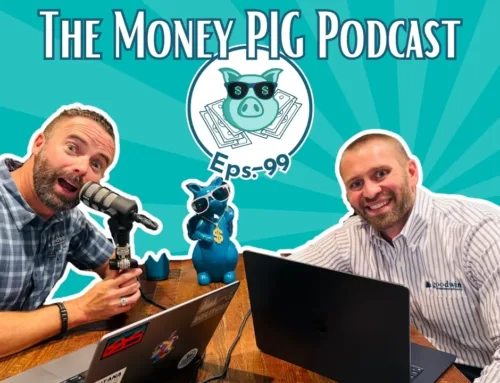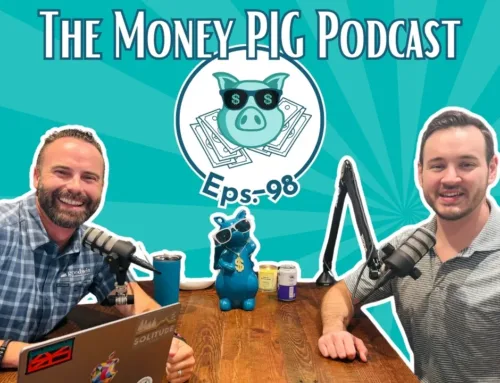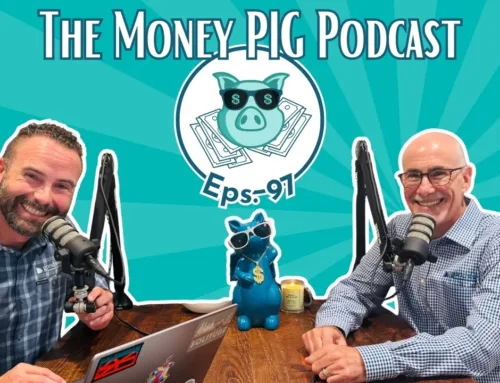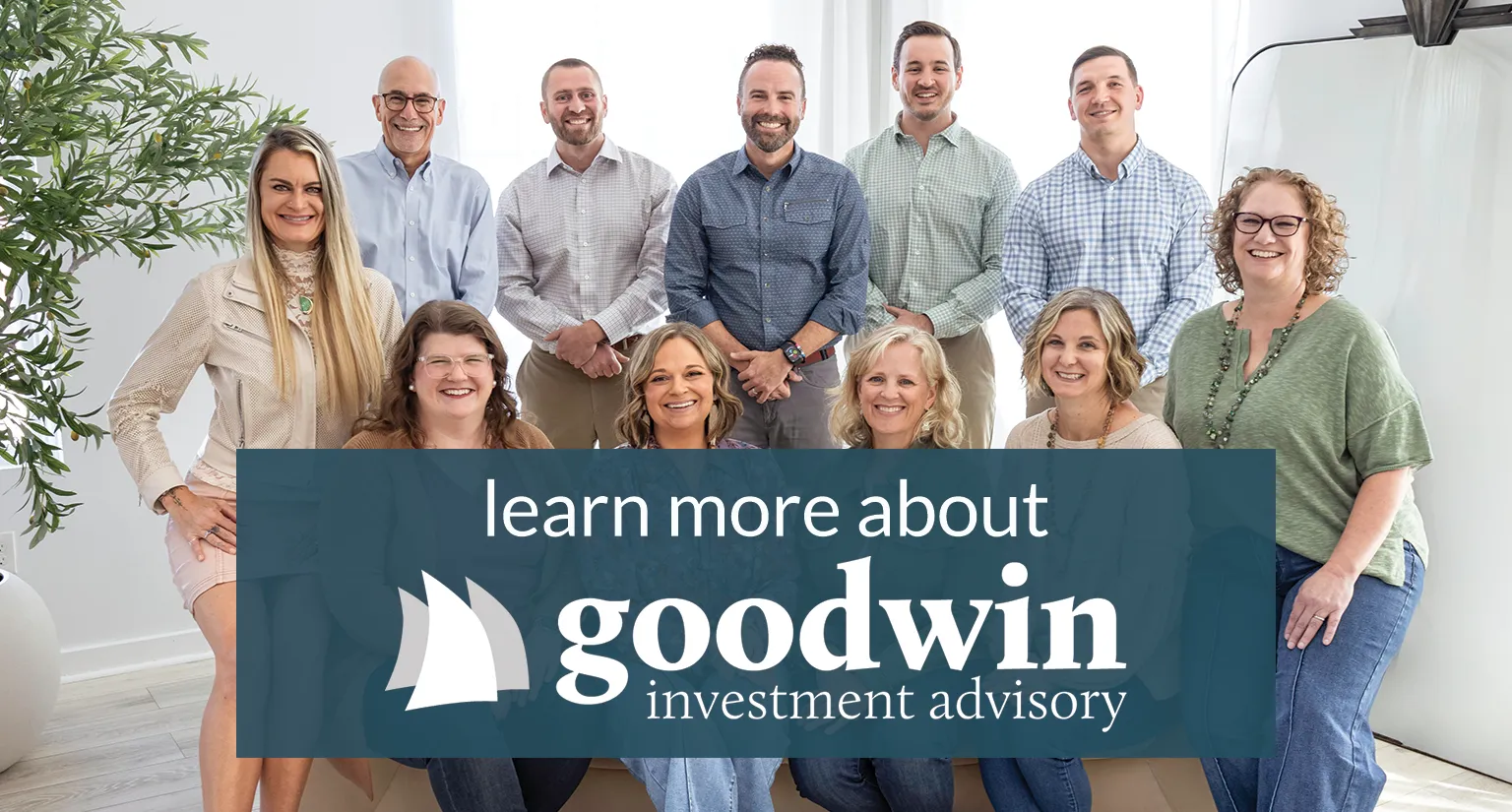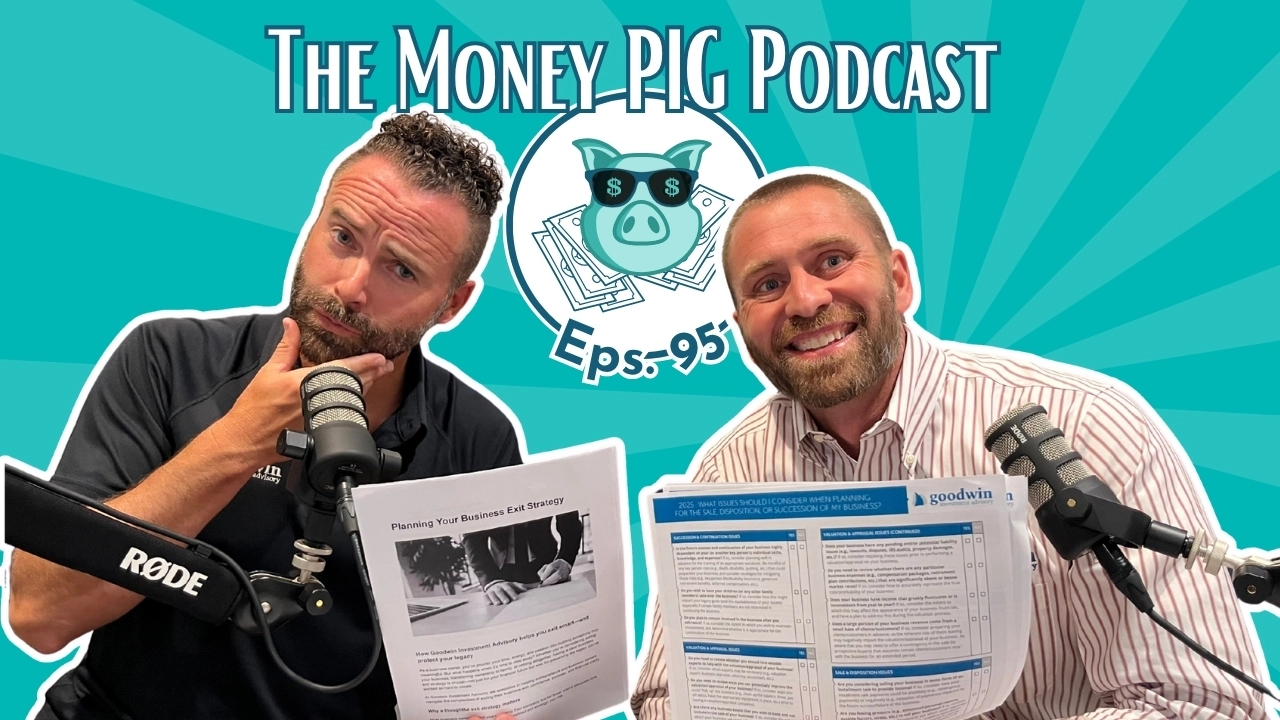
Summary:
In this episode of The Money PIG Podcast, Tim Goodwin sits down once again with the one and only Justin Pitcock to dive into the often-overlooked—but massively impactful—topic of business exit planning.
From small business tax strategies (like Section 1202), to donor-advised funds, installment sales, and ESOPs, this episode is packed with real-world advice on how to prepare years in advance to maximize your payout and minimize taxes. Whether you’re transitioning to retirement, family succession, or a full-on sale, this conversation helps you think beyond just the sale itself—and into what you’re retiring to, not just from.
Justin shares powerful insights on how to:
- Save potentially millions in taxes with proper timing and structure
- Avoid common pitfalls and financial regrets
- Use tools like DAFs, tax loss harvesting, and equity rollovers
- Preserve your legacy, culture, and team through thoughtful succession planning
And if you’re wondering what learning Spanish, Pokémon cards, and artificial intelligence have to do with financial planning—well, you’re in for a fun surprise.
Read the blog that inspired this episode and download the guide:
Like, subscribe, and leave us a review if this resonated with you!
Enjoy the episode?
Subscribe, share it, and leave us a review on Apple or Spotify!
For personalized financial guidance, schedule an intro call with our team at Goodwin Investment Advisory in Marietta, Georgia. Our CFP® professionals can provide advice and help you navigate how to invest your wealth and plan for your retirement. We’d love to help you live out your legacy! To learn more about the benefits and services we offer click here.
Goodwin Investment Advisory is a Registered Investment Advisory firm regulated by the Securities and Exchange Commission in accordance and compliance with securities laws and regulations. Goodwin Investment Advisory does not render or offer to render personalized investment or tax advice through the Money PIG podcast. The information provided is for informational purposes only and does not constitute financial, tax, investment or legal advice.
Transcript:
Welcome back to the Money Pig podcast. We were super excited to have the one, the only Justin Pickock, AKA Elmer Fudd. How you doing, Justin? Doing good. Super, super grateful to have you back on the pod today, where we’re going to be talking about planning your business exit strategy. Exciting times, exciting times, We can nerd out on taxes. Let’s go. Great. Yes. If there’s ever a time to nerd out on taxes for people, this saves them lots and lots of money to plan ahead. So before we get to that, would you like to share? Something maybe the audience doesn’t know about you, something interesting. There’s so much to Elmer Fudd that the audience wants to know, Justin. I don’t know about that, but I’ll share. Coming up in a couple months, my little brother is getting married and the wedding is in Columbia, South America. why have it this country when you can have it in another country? know, right? That’s where she’s from there. She’s from Columbia. So I’ve been… trying to learn a little Spanish. So far it’s not going very well. Do you use that app? What’s the kids use? Duolingo? Duolingo. is that? You get the little click. Oh yeah. I hear that all day long. I get these notifications that says Justin I’m disappointed in you. I feel lonely. Oh wow. You haven’t revisited the app in a few days. Oh I see. Get back to a streak buddy. Is Emily going to this wedding? Probably not. Cause of that. Yeah. Just cause we’ve two boys and somebody’s got to stay with the boys school will have started by then. And so it’s going to be, it would be difficult for her to go. Yeah. Destination wedding. Well, that’s exciting. So, yeah. Bering, Kea, Columbia. Wow. Yep. Man. That’s awesome. Trying to book flights last night. I bet that was interesting. Yeah. Is it close to the airport or you got to like, you know, planes, trains and automobiles to get there. There’s, there’s no direct flights to Baron Kia. there’s a couple others Delta flies straight to, Cartagena, which is like two hours via bus, I guess that would be north of a Baron Kia. yeah. So, you know, might do that and get a bus ride. It’d an adventure. You know, just afraid that, I’m not going to be able to communicate well, cause I don’t think they speak English. So Tim Goodwin (02:37.006) Right. Man, while these apps now, I feel like you should have some AI wearable device with an earbud or something. There’s got to be, you know, I’ve had Google translate for a while. yeah. Duolingo though. Yeah. Yeah. You got it. You got, have this sucker. We’ve got, I’ve got, yeah. Uh, I guess, gosh, a little over a month to, pick up my Spanish game. Exciting. Exciting. So Justin, what did the retiring CEO say to his employees? Oh, wait a second. What did the retiring CEO say to his employees? I’m not leaving. I’m just delegating permanently. All right. So there maybe are some CEOs listening that would like to delegate permanently. Maybe folks want to start their business. So the reason why we’re talking about this today is because like you said, planning ahead probably a lot earlier than maybe most business owners would think could potentially save them a lot. So you really don’t want to think about Okay, I’m ready to exit my business and sell it this year or let’s go. I mean, if that happens, that happens and certainly could because of health reasons or other complications. But hopefully you can get ahead of that exit and start making some plans because if you do, it’s going to benefit you. to pay dividends. Yeah, it’s going to pay dividends, right? There’s a whole lot that you could be doing in advance up to like, you five years or more in advance to make sure that you pay less in taxes. So it’s important to start with the end in mind and start getting your ducks in a row if you think it’s a possibility. Right. So maybe go ahead and start breaking down some of those things like, what’s happening five years ahead? And really like it comes down to taxes, right? Or we’re trying to help our business owners save money and taxes. It’s going to be probably, you know, the largest liquidity event in their life. If it’s done the wrong way, a whole lot more money could go maybe to Uncle Sam. than maybe with some other thoughtful planning. go ahead and talk to us a little bit more about what are some ways that a business owner can reduce their tax exposure during that sale or transition. So one of the big things, it’s called Section 1202 and it’s an exclusion on what’s classified as a small business stock sale. So if a small business is classified as a business with 50 million or less in assets. Tim Goodwin (05:03.918) you know, there’s some runway there, but, um, and there’s a lot of rules around it. We won’t get into the weeds here, but you could technically sell that business and all the gains are tax free. Hmm. That’d be nice. Now there’s excluded businesses, uh, like for example, financial services is an excluded business. Right. Yep. So, you know, if your business, uh, could qualify legally organizing your business, um, in a advanced for that sale could save you, you know, hundreds of thousands, if not millions of dollars in taxes. So it’s important to 12. Yes. Section 12. of the internal revenue code. Yep. So, I mean, that’s just an example. Like if you’re going to, if you’re an LLC, you’ll need to become a C corp, not an S corp, you know, so, and you need to do that five years in advance. There’s the five year market. Okay. Right. So that’s, that’s one there’s Other strategies where the timelines not five years, like funding a charitable trust, funding a donor advice fund, those are sort of thing or those are the type of things that you would do kind of pre-sale, but you would generally have like a letter of intent. Yeah. Yeah. And I love the donor advice fund one, the DAF, right? know, getting, yeah, it’s really, really simple. That’s what it takes for me to fully understand and be able to articulate it, Justin. You take on the complex stuff. But yeah, if you’re getting really close to selling a business, maybe even you are transitioning it to family members. at the time where maybe it’s got watermarking at near a highest value, contributing, let’s say you were going to sell 100 % of the business. and you are going to give away 10 % of your sales proceeds, then in advance putting 10 % of that in a donor advice fund is kind of like putting it in your own 501c3 because it is a 501c3. So that way when you sell your business, you’re really only going to realize, you know, maybe potentially taxable gains on the 90%. Because basically a nonprofit owns a 10th of it, 10 % in this case. you know, kind of less money on Uncle Sam, you know, more money towards the nonprofits and NGOs you like. So, but there is a timing thing with that in terms of, you know, Tim Goodwin (07:22.646) got to do that at the right timing. So it’s good to talk to your advisor and your CPA, you know, funding the the donor advice fund after you have your business under contract, I think is a violation, right? Yeah, that’s right. You kind of got you got to get ahead of that and do that. Not maybe too early, but too late either. So that’s a really great one. I think a real another really simple one because I understand it. You know, let’s say you sell your business kind of near the end of the year. Maybe they could give you you know, half of it installment sale, right? Yeah. So explain, break down the installment sales. So an installment sales just where you’re paid over time. And so it could be, you know, two years, could be, you know, December to January, or it could be over like, for example, five years. And that just kind of spreads out the income that’s coming in. So you’ll have an opportunity to have more and lower tax brackets. For example, the long-term capital gains rate for a joint filer is just over 600,000 this year. So just ride and let off to the top of your head. That’s total income. you’ve got W2 income, capital gains are stacked on top of that. But what if you did this over five years, you got more of that income taxed at 15 % versus 20%, maybe less of it taxed. with the net investment income tax, which is an additional 3.8 % that’s on income over $250,000. So there’s some ways where maybe you could spread it out over time. You could reduce some of your tax burden that way, but that comes with risks. What if the new leader doesn’t manage the business as well as you did, and a couple years down the road, they don’t have the money to pay you? So there’s risk with it, but it could help. minimize tax. Also, that strategy could be coupled with donor advice fund at the beginning, it could be coupled with a tax loss harvesting strategy. So currently helping a couple clients with us right now. And it’s a way that you could create losses, paper losses to offset a capital gain and we can Tim Goodwin (09:38.712) create a investment strategy where you invest maybe that first wave of the sale proceeds and something like an S &P 500 index. Now we would actually be buying the individual stocks, not an index fund, but we would actively tax loss harvest that. Now your investments, your account’s going to perform like the S &P 500. It may have a very small tracking error, but we would expect very similar performance to the S &P 500. Meanwhile, we’re accumulating paper losses that can offset the gain from your business. So if you do an installment sale, it just gives us more time to create paper losses. And since you can carry forward losses, like maybe even before you’ve gotten installment payments for selling your business, maybe you your own retirement assets, your own savings. If you can start kind of harvesting these losses, carry those losses forward and advance some of these installments, could absorb some of that. That’s right. And that, it has to be outside of a retirement account. know what you meant there, but, so it’s gotta be in a taxable account. We can go ahead and start doing that. And there are some really cool strategies out there, that are actually available more so, to, guess I wouldn’t, don’t know that the average person’s the right word here, but Somebody that’s got a million or more of investable assets, there’s some strategies that’ll run a long and a short side. That’s where your own and profit from stock prices going up. The short side would be where you would actually profit from stock prices going down. And when you couple those two pieces together in the same account, we’re still trying to replicate the performance of the targeted index, but there’s almost twice as many tax loss harvesting opportunities. And there’s a strategy that I know of that we can implement for our clients where over about a 12 month period, it’s got a track record of harvesting up to about maybe 90 % of the amount invested. So if you invest a million dollars, you could have paper losses of about 900,000 in 12 months potentially. Tim Goodwin (11:49.038) And your account value is not $100,000 at that point. Hopefully it’s or maybe it’s growing. If the index is up, then your money has grown. That’s super duper powerful. And that’s huge. That space is getting a lot of attention. And I know the custodian that we use, Fidelity, they’ve got a whole team that’s dedicated in this space that we work with. It’s a huge value. Yeah, that’s awesome. Yeah, that’s great. I’m going to jump us back out of like the deep strategy, which because that’s that’s an awesome one. I think that’s really powerful to hear going back to the installment payments over multiple years. A lot of times like my, my friends, my colleagues, my mentors, my clients that have sold their businesses to a lot of times that ends up being earnouts, right? Right. So you as maybe the founder are sticking around for a year or two or three, and you’re making sure certain metrics are hit. And then you’re getting these kind of second, third, fourth, fifth installments, but they’re kind of tied to an earn out. And then actually, you and I have talked about this before, or even some solutions we’ve talked to clients about here is, hey, let’s like owner finance, right? So it’s like a loan. in a way, you’re kind of getting an installment, but you’re not realizing a huge capital gain all at once because they’re making a payment. You’ve done like an owner finance loan, if you want to break that down. Yeah. So, you know, if if it’s particularly like on your team that’s wanting to buy ownership, that owner finance could really work really well. And so it’s given them the opportunity to kind of get the capital. for our industry, there’s a lot of lenders out there that would be happy to make a loan, but when the owner makes the loan, it can go a whole lot smoother. collateralized by the equity. Like you were talking about before with the installments, there’s a risk to the seller that there’s not a business in the future to make those payments, but if it was collateralized by an asset or something else, it would reduce the risk. that’s super cool. So any other tax strategies before we move on? just one, guess, just there, you should be cautious doing an installment sale. I’ve actually got a client right now that Tim Goodwin (14:05.794) the business that bought his business, he was supposed to get paid out over three years. Well, they’ve gone bankrupt. So he’s not getting that last payment. Even though, his, the business that bought him out had lots of different business segments. His business segment continued to be profitable and do well. The other, the existing businesses that the company had brought it all down. And so, I mean, he’s in a mess now. He’s really counting on that. Dang. wonder if he had like a non-compete or something that’s no longer going to hold up and then he can just kind of resurrect it. So I met a guy, I got to serve on the Board of Trustees and my alma mater many years ago and I met a guy, a gentleman there and same thing, like company, bought his company and then he kind of retired earlier, but then that company went out of business. And so he restarted his business, got to call his best people, his best clients. And he said like in two years, he was back to where it took him 20 years to get to the first time. I mean, that may not be what you want. You might be done with, having that much, or you know, sweat and tears you want to put into it. yeah, you know, at that point, you might be able to, you’re in good position to do that. Yeah. So the last thing that I would kind of share around the tax strategy, it’s maybe, you know, again, it’s like, some of my, again, clients and friends, colleagues, peers, they don’t necessarily take all cash, whether it’s upfront or over time, they will take some form of equity in the company buying them. Now that may not be what you want to do, but I think it’s a good consideration. like, hey, I’m going to take, let’s say you’re going to give me a million dollars for my business or $10 million. Let’s say 10 million. I’m going to take $5 million in cash. And maybe that is spread out over installments. The other 5 million I want in the company buying me. So what’s cool is if you really believe in that company, now you own part of that company, you might still have a voice in how they you know, treat your current company and you kind of go from doing to maybe mentoring and being a part of that potential leadership team. That new business can be really fulfilling for that founder who is, you know, selling their, their dream job that they invented and made, right? That can make it a lot easier for the buyer too. Right. It’s when they’re, when they’ve got a currency that doesn’t Tim Goodwin (16:23.552) actually cost them. Yeah, and then they’re bringing on the founder and maybe CEO or president of the company they’re buying is going to come in now as an owner with a leadership super sticky. So that’s a really good transition to our next topic, which is around like, how much legacy matters like, you know, how much legacy matters here, how much it matters to me and the team, like we’ve got a culture here, we got mission, we got vision, we got values, we’ve got leadership. I know for, for me, as I think about it, I can’t be the CEO of GIA forever, there’s still gonna be, I still got a long runway. I I’m spring chicken, but pretty close, you know? So I’m a fall chicken, whatever that means. Anyway, moving on. So, but that is something I think about too. You know, I wanna know that whether I’m here full-time, part-time, or only as an owner, or later as an exit, that the mission and the culture and the values are protected. And so one way to do that could be through an ESOP. yeah. Employee stock ownership plan. hear about that. That sounds wonderful. And the business has to be big enough for this to make sense because it’s a qualified plan. It’s regulated by the IRS and there’s a lot of hoops you have to jump through to set this up. it’s where basically a trust is created. The business takes out a loan to fund the trust by the ownership from the company. And then those profit… the distributions, the profit from the business pays for that loan. Now the employees get to buy the ownership out of the trust. And so it’s a way that it can become an employee owned business. And I think as far as keeping the culture and the values in place, it’s a way to keep the team really invested. so there’s a critical mass that a company has to have to be able to do that though. Right. And I think the you know, the founders of the larger shareholders got to be able to contribute at least a certain amount, right? That’s right. They would sell it to the ESOPs. You’re getting paid out. Exactly. And the trust, like you said, takes that loan to buy it. And then the employees are kind of buying and selling from that trust. Yeah. Super duper cool. I love that. So, all right. So let’s say, let’s move on. We’ve got this big sale. The question is now what? Tim Goodwin (18:37.644) How does Goodwin Investment Advisory guide former business owners in turning that liquidity into a sustainable purpose-driven retirement for their next chapter? That’s, I think, probably one of the biggest things when you read about business owners selling their business. like, what are they going to? Because the business is like their child. It’s especially, you know, for men, they tend to put their whole identity into their work. So it’s, are you transitioning to? And, you know, there’s, there’s, it’s common for folks to go through some sort of depression after they’ve sold their business. It’s like they’ve lost their best friend. Having that big bank account isn’t going to keep depression away. So there’s, think having a lot of thought about what are you transitioning to and possibly having some help kind of think through that. What, you know, what is, what is your legacy? What do you want it to be? But then there’s also the financial aspect of, well, all right, I got this big payout, what am I gonna do with it? And I think this is where you should plan ahead of time as well and know how you’re going to turn that lump sum or that, whether, or installment sale, whatever, turn that into the income that you need for retirement. And so that’s where thoughtful investment planning can really come into play. We help clients put that into, portfolios that are tailored to towards their risk preferences to their income needs. We use, you know, different types of investment vehicles, some that are more income driven. We aim to build more stability there where, you know, they don’t necessarily have to be as worried about the fluctuations of the market. And the market’s always going to fluctuate. you know, I guess, thoughtful investment planning would be a big piece. Yep, absolutely. Yeah, and I think that’s really cool that you brought up. We’re not only just going to work on the portfolio for the client, how to make it sustainable and how to make sure that income’s there for them to meet their dreams, but really being intentional about not just what they’re retiring from, but what they’re retiring to. Tara sat across the table for me. She’s developed this really great framework around retire by design. So I can imagine, like you said, for some of us guys starting businesses, lot of our identity and meaning purpose tied up in our jobs. So we might have been thinking a lot about Tim Goodwin (21:01.996) that but as far as like what’s on the other side, maybe there’s some dreams, some hopes, maybe we’ve got some ideas but to be really intentional and sit down and be excited about what you’re retiring to, you so you’re excited about that next chapter, you’re excited to kind of have that exit, you’ve got all the ducks in the row in terms of saving taxes, now you really are excited about the next chapter. That’s right. Okay, so last question here. Are there any like common mistakes or pitfalls, blind spots that you see owners facing when they exit their business? and how can maybe working with the right advisory team help out? think just not having a plan right in the beginning is that’s pretty common and not or maybe not knowing or underestimating the emotional side of it and so just know that that’s normally pretty complicated and I think being as prepared as you can be for it. Yeah, that’s awesome. And kind like we’ve been saying, just waiting too long, you said not having a at all. But you know, we certainly love to be invited in that conversation. But when the client’s like, I’m ready to sell the business this year, and they haven’t done any of this planning before, we’re like, oh, man, you sure you don’t want to wait a year or two? We could have been tax loss harvesting. We could have, you know, funded a charitable trust. We could have, you know, converted from an LLC to a C Corp five years ago. Like there’s, you know, all these could have’s but Like if we need to know what your end goal is and then start working towards that. And you probably could have done some things to make your business more valuable. Yes, absolutely. so working towards that where you’ve kind of cleaned up the business and maybe it’s accounts that aren’t as profitable or whatever, you start streamlining the business. there’s working on the business, there’s having a plan as what you’re going to do with the proceeds, having a plan for what you’re going to do with your time afterwards. All of those things. Having a tax strategy. I totally agree with that. I think one of the other blind spots is not knowing there are all these options. A lot of them we’ve just talked about. Client comes in talking about selling their business and they’re like, I’m going to do ABC. I’m like, well, there’s also X, and Z. That’s right. I didn’t think about that. Tim Goodwin (23:25.422) I have a real life example, same thing where the client, know, it’s just I said, Hey, if you did a couple different things, you could get a lot more for your company. Well, while he decided to wait and start doing that, but while he was doing that, making his company more valuable, he realized he didn’t really want to sell it to his competitor. He wanted to pass it down to his family members. Right. And we had some really cool conversations you’ve actually taken over for me for that client. But yeah, I guess the pitfall would be like, take your time, make the plan, but take your time. Right. So you make the right decisions, you save the taxes and you really preserve what you want to preserve, whether it’s for your family or for you and your future. So, awesome. Well, thank you so much for joining us, Justin. Hey, if you’re still with us on this podcast, no, it’s not the most riveting, but man, if you are about to own a business or you own a business, this can be super duper helpful to understand the implications of these things might, like you said at the beginning, might save you hundreds of thousands, not millions of dollars. And so I always love to end the podcast with gratitude. So I’ll kind of share what I’m grateful for why you take a second to think about it. I am actually super grateful for chat GBT. Then, then kind of I don’t know, a good decent user of chat GBT here. And we always share as a team how we’re using it. But like this past couple days, I mean, asking you for help on replacing an O ring, and a leaky water pressure, picking cat food replying to emails. Um, we finished watching a movie in the movie theater and we were all like, Hey, is there like a secret scene after the credits? And I was like, I don’t know, just as chat GBT, whether it’s late or not. Right. So, um, I am just super grateful to, mean, I love wondering, you know, and I think it’s okay to wonder. I don’t, don’t wonder as much because I can just ask chat GBT who I call Jarvis. So what about you, Justin? What are you grateful for? go with that theme. Um, so my seven year old loves Pokemon. think all kids do right now, but, uh, He’s all the time asked me to say, dad, can you look up what this Pokemon cards worth? And I’m like, I have to? So I learned that you can take your chat GPT, take a picture of the card and ask it what it’s worth. And it figures it out. And it’s like made me help my son, you know, cause he’s all into it. And of course I want to be able to do this for him, but it’s really saved me a lot of time. That’s great. That’s great. lot easier. Still, giving the answers, just not taking as long. That’s right. Tim Goodwin (25:47.554) Want to get let the listeners know that we have a actually a downloadable guide here. And so what issues should I consider when planning for the sale, disposition or succession of my business so you can get that through the show notes or through our website. We also have a blog on planning your business exit strategy. So more content coming soon on our website. But if you’re not already subscribed to our blog, you can you can do that as well through our website and we would love to hear from you so wanted to also end with gratitude for our producer Angela and our copywriter Tara who are sitting across from us. Thank you guys so much. Y’all do a great job. Bye bye.
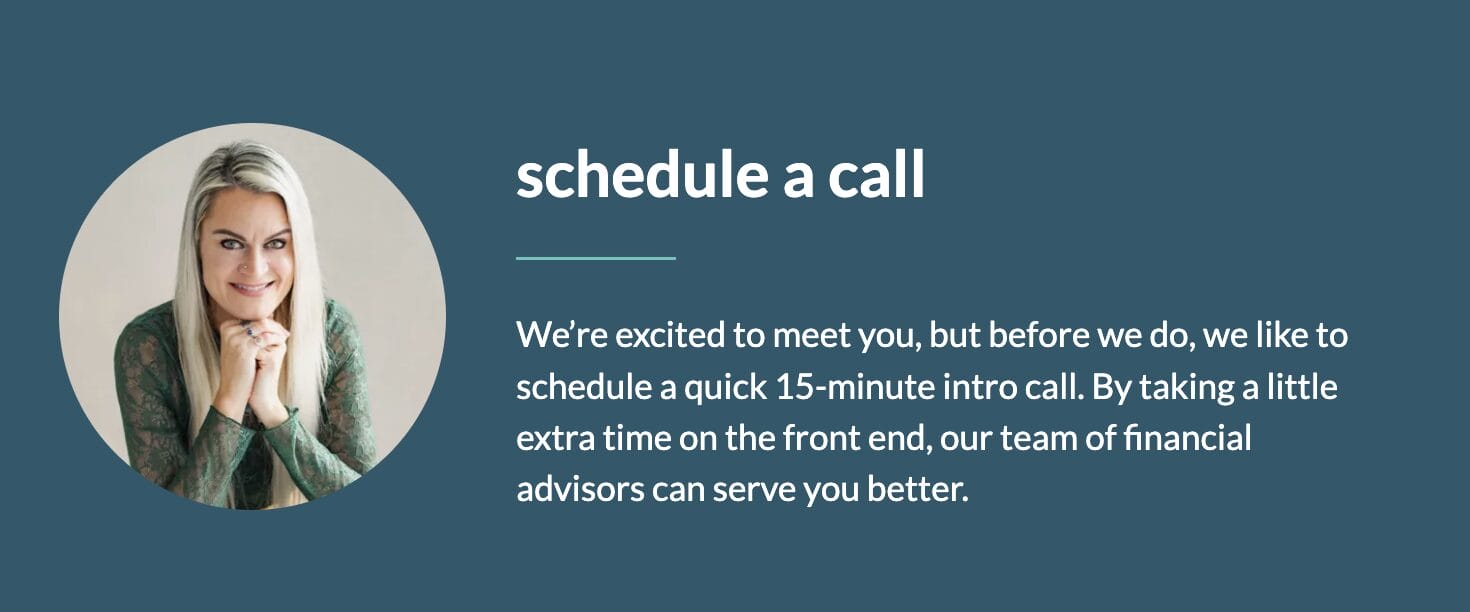
The Money PIG podcast is hosted by Reid Trego. Goodwin Investment Advisory is a Registered Investment Advisory firm regulated by the Securities and Exchange Commission in accordance and compliance with securities laws and regulations. Goodwin Investment Advisory does not render or offer to render personalized investment or tax advice through the Money PIG podcast. The information provided is for informational purposes only and does not constitute financial, tax, investment or legal advice.
For personalized financial guidance, schedule an schedule an intro call with our team at Goodwin Investment Advisory in Canton, GA . Our CFP® professionals can provide advice and help you navigate how to invest your wealth and plan for your retirement. We’d love to help you live out your legacy!
Goodwin Investment Advisory is a Registered Investment Advisory firm regulated by the Securities and Exchange Commission in accordance and compliance with securities laws and regulations. Goodwin Investment Advisory does not render or offer to render personalized investment or tax advice through the Money PIG podcast. The information provided is for informational purposes only and does not constitute financial, tax, investment or legal advice.

